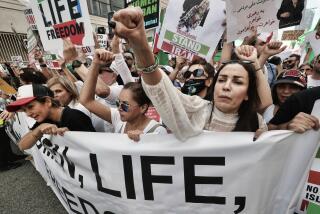Hussein Throws a Sop to Bad Students
- Share via
BAGHDAD — Trying to increase public support for his regime, President Saddam Hussein is doling out what he calls rewards to his people, most recently with a decision Friday to allow students who have failed school to return to their studies.
Even suggesting a lack of fidelity to the leader could result in serious punishment in Iraq. It comes as no surprise that everyone responds to questions about the president as did Ehab Rafe, 29, an electronics shop owner. “We are all with our president,” he said.
Nevertheless, when authorities announced that Hussein had overruled another law for the benefit of ordinary Iraqis, the moved was widely viewed as an attempt to win public favor. “The leadership is trying to get popular support,” said Suad Mohammed, 56, a high school English teacher.
The Iraqi government is feeling threatened, not only from the United States but also from within its own borders. Though the regime, relying on its network of police and security services, remains firmly in control, there is concern that pressure from America could inspire an opposition. To help shore up his position, analysts and diplomats say, Hussein has been trying to present himself as a benevolent, if authoritarian, leader.
The official line, published in the newspaper Al Iraq newspaper -- which is owned and operated by the government -- is that Hussein wants to reward his people for their unparalleled show of allegiance.
The government held a referendum last week on Hussein’s leadership, and the regime said that every single one of the nearly 11.5 million votes cast was in support of the president.
“Within the framework of the reward of the president to his loyal people, his excellency ordered students who don’t have the chance to restart their studies to have the chance again,” the newspaper reported with a banner headline across its front page Friday.
Anyone who fails the same grade a total of three times in Iraq’s troubled school system is thrown out. Success or failure in school can have a direct bearing on how long a young man must serve in the military. University graduates serve about half the time of dropouts, who are committed to three years in the army.
But this nation’s interest in education has waned in recent years as young people have left their studies so they can work to help feed their families. It is questionable whether many young people will now return to their studies.
Hussein first hinted that he might try to soften his image at home in a speech he made after the referendum on another seven-year term. The speech was typically full of attacks against the United States and Israel.
But instead of firing a weapon in the air, as he often does when appearing before audiences, the man who has ruled this country with an iron fist for two decades tried to present himself as sensitive to the needs of the people.
“I shall not close the door of forgiveness before any sincere penitence to Allah and any willingness to renounce everything harmful,” he said toward the end of his speech.
Not long after the speech, Hussein issued a decree freeing almost every criminal and political prisoner in the nation’s vast detention system -- except those accused of spying for America or Israel.
The exodus of thousands of prisoners was greeted here as a “gift,” especially to the families of those who were locked away.
But the nice guy image was clouded when it became clear that many prisoners who had been taken away over the years would never return. Family members who showed up at government offices asking for information were forced to disperse.
The leadership announced this week that there is also a plan in the works to eliminate a tax on all travelers who want to leave the country. The plan is to do away with the fee of 400,000 dinars, or about $200, that every Iraqi must pay to customs officers when going abroad.
The proposal has reportedly been approved by the Cabinet and recommended to the Revolutionary Command Council, which is virtually certain to go along.
The government will still discourage people of draft age or those already serving in the military from crossing the border. But others, particularly people doing business in neighboring Jordan, stand to save a lot of money by Iraqi standards.
For most people, who barely have enough money to get by, the change would have no immediate effect. But the plan has been widely perceived as a nice gesture by the president.
“It is an excellent thing,” said Hussein Shadidi, 56, a retired military officer who said he could not afford to travel. “It is more liberty and freedom for citizens.”
More to Read
Sign up for Essential California
The most important California stories and recommendations in your inbox every morning.
You may occasionally receive promotional content from the Los Angeles Times.










